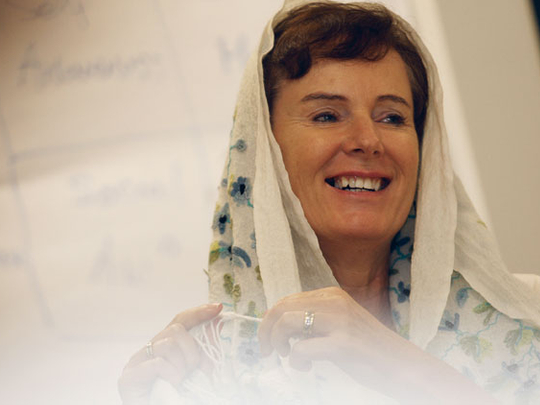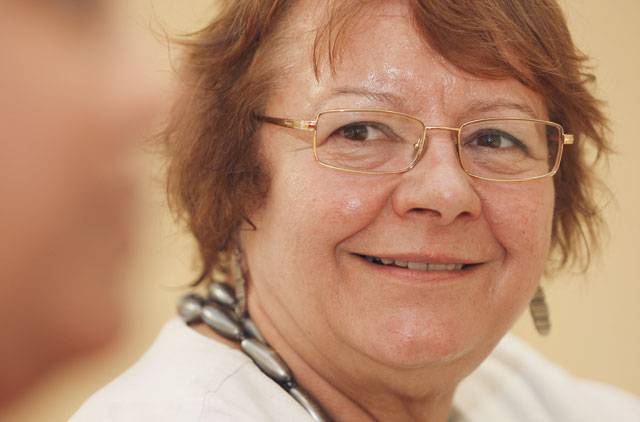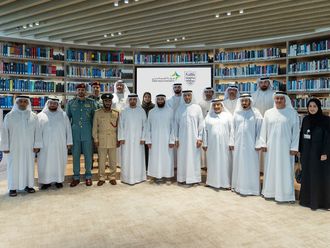
Dubai: A woman sits with a scarf draped over her head, imitating long hair. She slouches back in her seat and picks at the end of the material, while recounting what she does for a living. It's not actually her job, however, it's the job her neurolinguistic programming (NLP) partner does, and this is an exercise in "mirroring".
Mirroring is matching what someone else does and aims to enhance rapport between two people. It also helps the person being mirrored to understand how they project themselves.
At a workshop held recently by The Change Associates at the University of Wollongong in Dubai (UOWD), workshop participants first introduced themselves to each other, then mirrored the other to the rest of the group some with amusing results.
This was just one exercise of many under the umbrella of NLP, which is "a means of communication, a therapy and the how-to of emotional intelligence," Beryl Comar, NLP trainer who set up the company told Gulf News at the workshop.
"It's about self-awareness, self-management, social awareness and relationship management," she said.
Visit the neurolinguistic programming (NLP) website
Comar, 61, a Briton, says she is the first to bring NLP to the UAE and has been living in Dubai for the past 34 years. However, she first became interested in NLP back in 1984, while studying applied linguistics for a Masters degree.
So how can NLP help people in a practical sense? Abdullah Al Khalifa flew from Bahrain to Dubai specifically for the course. "Many of the techniques I have learned in NLP are useful in my everyday life," the 25-year-old moderator and government employee said.
"It's useful in my public speaking and it's useful in my mediating: it has a lot of techniques where you have more effective communication with people; you understand people even better. It's [NLP is] very fruitful and rewarding and even without noticing it, even subconsciously you practice it," he said.
NLP was co-founded by Richard Bandler and linguist John Grinder, who also coined the term, in the 1970s. The two promoted the training to address problems such as phobias, depression and learning disorders, for example. It was later promoted as a science of excellence.
Comar explained that Bandler and Grinder realised that psychiatrists and psychologists were studying people with abnormalities and then taking their knowledge to the normal segment of society. What they decided to do was study people who were excellent in the way they did things and take that to normal people instead, so they also can become excellent in their lives.
"So if you want to know how Oprah became Oprah and you now want to become Oprah, you find out what she did, how she thinks, you get into her breathing patterns, you get into her eye movements," Comar said, continuing that successful people read biographies because they're stepping into the model of successful people who have gone before them.
Shelina Nazim, from Portugal, 35, first undertook NLP training for stress when she was managing a company and had developed a stomach ulcer. She wanted to address her stress without medication.
"I started getting into this because I wanted to help myself without any medication, and then I fell in love with this part of work. So first it was about me and growing and understanding it, and then it became about doing it with others," she said. She now practices NLP on others, and has trained in Reiki, hypnotherapy and meditation.
One of the workshop attendees, Comar said, was terrified of water and couldn't get into a swimming pool. By her second week of NLP, she found that the pool she'd been so terrified of was actually chest-deep in the deep end. "Most of us are terrified of things that we don't even know what they are," she said.
A different way of dealing with grief
NLP trainer Beryl Comar told Gulf News that she is her own success story, having used NLP techniques when her husband died last November.
"If it hadn't been for NLP, I would have fallen apart. It's how you look at things," she said.
An instant reaction when someone informs another that a loved one has died is to say that you're sorry. "When you say you're sorry, I have to push that away, because then I go into ‘sorry' state," she said. People can learn to give better communication, she continued, by saying instead "I'm sure you'll be fine, everything's going to be fine", and even use body language, by raising your hand up while saying ‘I'm sure things are going to look up for you'.
"By using your hands, you can actually change people's state," she said.
What is NLP?
NLP stands for neurolinguistic programming, which was developed in the 1970s by Richard Bandler and John Grinder, a linguist.
NLP is a discipline that studies the processes of how people live their lives, patterns of behaviour and communication. Patterns include thinking processes and the organisation of states of mind as well as observable actions in the world. States of mind include emotions and how attention is directed through senses. The focus of NLP is on identifying patterns of excellence to model, codify and disseminate into the world as examples of human excellence.
Source: www.NLP.edu.au
Perspective: What is NLP?
NLP stands for neurolinguistic programming, which was developed in the 1970s by Richard Bandler and John Grinder, a linguist. NLP is a discipline that studies the processes of how people live their lives, patterns of behaviour and communication. Patterns include thinking processes and the organisation of states of mind as well as observable actions in the world. States of mind include emotions and how attention is directed through senses.
The focus of NLP is on identifying patterns of excellence to model, codify and disseminate into the world as examples of human excellence. This activity is called modelling and is the central purpose of the field. It is also one of the key features that distinguishes NLP from psychology.
Do you have a phobia? How far would you go to overcome it? Would you opt for NLP if it helps you communicate better?













